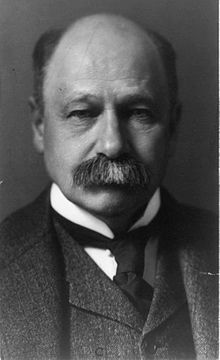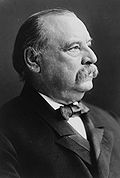| Daniel S. Lamont | |
|---|---|
 | |
| 39th United States Secretary of War | |
| In office March 5, 1893 – March 4, 1897 | |
| President | Grover Cleveland |
| Preceded by | Stephen Elkins |
| Succeeded by | Russell A. Alger |
| Private Secretary to the President | |
| In office March 4, 1885 – March 4, 1889 | |
| President | Grover Cleveland |
| Preceded by | Fred J. Phillips |
| Succeeded by | Elijah W. Halford |
| Personal details | |
| Born | Daniel Scott Lamont (1851-02-09)February 9, 1851 McGraw, New York, U.S. |
| Died | July 23, 1905(1905-07-23) (aged 54) Millbrook, New York, U.S. |
| Resting place | Woodlawn Cemetery |
| Political party | Democratic |
| Spouse | Juliet Lamont |
| Education | Union College |
| Signature | |
Daniel Scott Lamont (February 9, 1851 – July 23, 1905) was the United States Secretary of War during Grover Cleveland's second term.
Early life
Lamont was born on his family's farm in McGraw, New York (then called McGrawville) on February 9, 1851. He was a son of John B. Lamont, a merchant from Cortlandville, and Elizabeth (née Scott) Lamont. Lamont, of Scotch ancestry, had a family lineage that could be traced back as far as 1250.
He waited on customers from behind the counter in his father's store. He attended the Central Academy, successor of New York Central College, in McGraw. He attended Union College at Schenectady, New York. While attending Union College, he joined the Delta Upsilon fraternity.
Career
He was employed as engrossing clerk and assistant journal clerk in the state capitol at Albany, New York, was a clerk on the staff of the Democratic state central committee in 1872, and was chief clerk of the New York department of state from 1875 to 1882.
In 1883, through his mentor Daniel Manning, Lamont was assigned to then-New York Governor Grover Cleveland's staff as a political prompter. He became private and military secretary with the honorary rank of colonel on the governor's staff the same year, and continued in his service after Cleveland became president in 1885. Lamont also held employment with William C. Whitney in his business ventures in 1889.
From March 5, 1893, to March 5, 1897, Lamont served as United States Secretary of War in President Cleveland's cabinet. Throughout his tenure, he urged the adoption of a three-battalion infantry regiment as a part of a general modernization and strengthening of the Army. Furthermore, Lamont recommended the construction of a central hall of records to house Army archives, and urged that Congress authorize the marking of important battlefields in the manner adopted for Antietam. He also recommended that lands being used by Apache prisoners at Fort Sill be acquired for their permanent use and their prisoner status be terminated.
Later life
After his service as Secretary of War, Lamont was vice president of the Northern Pacific Railway Company from 1898 to 1904. He was also a director of numerous banks and corporations. In 1889, he went into business with William C. Whitney (Cleveland's Secretary of the Navy) and Oliver Hazard Payne (organizer of the American Tobacco trust).
In August 1904, he was considered as a candidate for Governor of New York, with The New York Times writing "Qualifying experience in large public and private affairs, ability and executive capacity already demonstrated in high office, and personal character quite above all impeachment or assault unmistakably designate Daniel S. Lamont as a fit candidate for the Democrats of New York to name for the Governorship."
Personal life
Lamont was married to Juliet Kinney and had three surviving daughters, Frances, Elizabeth (Bessie), and Katherine. A fourth daughter, Julia, died in 1902 at 18 years old. Lamont spent his early summers in the Gray Gables neighborhood in Bourne, Massachusetts, on Cape Cod, near where Grover Cleveland owned a house. Cleveland and Lamont were known to have many parties during the summers. His old house still stands. In 1888, he began spending his summers on the coast of Maine and bought a house in Sorrento known as Blueberry Lodge, which also still stands today.
Lamont died at his country home, Altamount in Millbrook, New York, on July 23, 1905, at aged 54. He was buried in Woodlawn Cemetery, in The Bronx, New York City. After his death, his widow continued the families close relationship with the Clevelands.
References
- ^ "Daniel S. Lamont Dies After Drive; Ex-Secretary of War Passes Away at Millbrook. Message Sent to Cleveland; Col. Lamont Was Associated with Famous Democratic Leaders -- Left Polities for Railroads" (PDF). The New York Times. July 24, 1905. p. 1. Retrieved May 4, 2022.
- "Col. Daniel Lamont—The Youngest Member of Mr. [Grover] Cleveland's Cabinet—A Young Man who Has Enjoyed the Friendship of Democratic Leaders from Samuel J. Tilden Down to the Present Day". Wichita Daily Eagle (Wichita, Kansas). March 29, 1893. p. 6 – via newspaperarchive.com.
- Bell, William Gardner (1992). "Daniel Scott Lamont". Secretaries of War and Secretaries of the Army. United States Army Center of Military History. Archived from the original on December 14, 2007. Retrieved July 19, 2010.
- "Daniel S. Lamont in Business" (PDF). The New York Times. March 12, 1889. p. 4. Retrieved May 4, 2022.
- "Daniel S. Lamont" (PDF). The New York Times. August 9, 1904. p. 6. Retrieved May 4, 2022.
- "Esther Cleveland in Rome.; Daughter of Former President Receives with Mrs. Daniel S. Lamont" (PDF). The New York Times. May 2, 1909. p. S3. Retrieved May 4, 2022.
External links
| Political offices | ||
|---|---|---|
| Preceded byStephen B. Elkins | U.S. Secretary of War Served under: Grover Cleveland March 5, 1893 – March 4, 1897 |
Succeeded byRussell A. Alger |
| Cabinet of President Grover Cleveland (1893–1897) | ||
|---|---|---|
| Secretary of State |
|  |
| Secretary of the Treasury |
| |
| Secretary of War |
| |
| Attorney General |
| |
| Postmaster General |
| |
| Secretary of the Navy |
| |
| Secretary of the Interior |
| |
| Secretary of Agriculture |
| |
- 1851 births
- 1905 deaths
- People from Cortland County, New York
- Union College (New York) alumni
- United States secretaries of war
- Northern Pacific Railway people
- 19th-century American railroad executives
- Clerks
- Personal secretaries to the President of the United States
- Cleveland administration cabinet members
- 19th-century American politicians
- Burials at Woodlawn Cemetery (Bronx, New York)
- Delta Upsilon members

